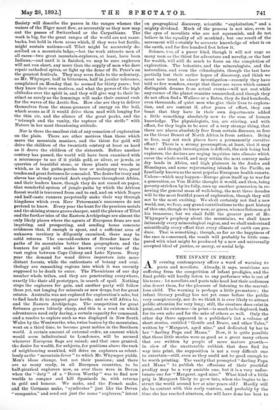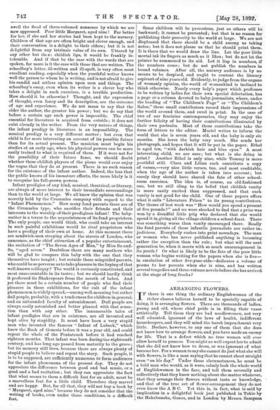THE INFANT IN PRINT.
AN evening contemporary offers a word of warning to poets and novelists. Already, it says, musicians are suffering from the competition of infant prodigies, and the fond public will hardly listen to any performer who is out of his teens : let novelists and poets take heed lest their audiences also desert them, for the pleasure of listening to the marvel- Ions child. The warning is perhaps a little premature ; the infant literary prodigy has not yet come before the public very conspicuously, nor do we think it is ever likely to attract public attention for very long; still, the creature does exist in print, and its existence—in print—is much to be deplored, both for its own sake and for the sake of others as well. Only the other day there appeared in a publisher's list a volume of short stories, entitled "Gentle and Brave, and other Tales," written by "Margaret, aged nine," and dedicated by her to her "darling Papa and Mama." Now, it is quite possible that those little stories were as good as a great many others that are written by people of more mature growth— in view of the unutterable rubbish that does find its way into print, the supposition is not a very difficult one to entertain—still, even so they could not be good enough to be worth printing. The vanity that prompted "darling Papa and Mama" to publish the effusions of their youthful prodigy may be a very amiable one, but it is a very unfor- tunate one for "Margaret, aged nine." What kind of a little prig is Margaret likely to grow into, when she begins to in the world around her at nine years old ? Hardly will she be content with this early venture, and probably by the time she has reached nineteen, she will have done her best to swell the flood of three-volumed nonsense by which we are now oppressed. Poor little Margaret, aged nine ! Far better for her, if she and her stories had been kept to the nursery. Children of that age are often bright and clever enough, and their conversation is a delight to their elders ; but it is not delightful from any intrinsic value of its own. Uttered by any other but thcss childish lips, it would be frankly in- tolerable. And if that be the case with the words that are spoken, far more is it the case with those that are written. The schoolboy's letter, ill-written and ill-spelt, is very often most excellent reading, especially when the youthful writer knows well the person to whom he is writing, and is not afraid to give his candid and artless opinion upon men and things. The schoolboy's essay, even when its writer is a clever boy who takes a delight in such exercises, is a terrible production. How should it be otherwise ? Thought, and the expression of thought, even fancy and its description, are the outcome of age and experience. We do not mean to say that the older the author, the greater his power; but we do say that before a certain age such power is impossible. The chief essential for literature is acquired from outside; it does not exist already in the writer. From the very nature of things, the infant prodigy in literature is an impossibility. The musical prodigy is a very different matter ; but even that child is far more interesting on account of its possible future than for its actual present. The musician must begin his studies at an early age, when his physical powers can be more easily trained to what is required of them. If it were not for the possibility of their future fame, we should doubt whether these childish players of the piano would ever enjoy the vogue that they do at present. There is no such reason for the existence of the infant author. Indeed, the less that the public knows of his immature efforts, the more likely is it to recognise his full-grown powers.
Infant prodigies of any kind, musical, theatrical, or literary, are always of more interest to their immediate surroundings than to the world at large. We all know the opinion that was secretly held by the Crummles company with regard to the "Infant Phenomenon." How many fond parents there are of the Crummles type, who sacrifice their friends and their interests to the worship of their prodigious infant! The baby- reciter is a terror to the acquaintances of its fond proprietors. The only people, one would think, who could take an interest in such painful exhibitions would be rival proprietors who have a prodigy of their own at home. At this moment there are sandwich-men straying about the streets of London, who announce, as the chief attraction of a popular entertainment, the recitation of "The Seven Ages of Man," by Miss So-and- So, "aged seven." Doubtless there are many mothers who will be glad to compare this baby with the one that they themselves have taught ; but outside these misguided parents, who could be so perverse as to take pleasure in the lisping of that well-known soliloquy? The world is curiously constituted, and most unaccountable in its tastes ; but we should hardly think it preferred its Shakespeare from the mouth of babes. And yet there must be a certain number of people who find their pleasure in these exhibitions, for the cult of the infant phenomenon is widely spread,—among well-meaning but rather dull people, probably, with a tenderness for children in genera], and an unbounded faculty of astonishment. Dull people are always easily astonished and better pleased with that sensa- tion than with any other. The innumerable tales of infant prodigies that are in existence, are all invented and kept alive by stupidity. It must have been a very stupid man who invented the famous "Infant of Lubeck," which knew the Book of Genesis before it was a year old, and could repeat the whole of the Pentateuch before it had reached eighteen months. That infant was born daring the eighteenth century, and has long ago passed from maturity to the grave; but its memory still lives, because there are always plenty of stupid people to believe and repeat the story. Such people, it is to be supposed, are sufficiently numerous to form audiences
for the infant phenomena of the present day. They do not appreciate the difference between good and bad music, or a good and a bad recitation ; but they can appreciate the fact that what seems to them a difficult feat for an adult, must be a marvellous feat for a little child. Therefore they marvel and are happy. But, for all that, they will not buy a book by "Margaret, aged nine," because they do not consider that the writing of books, even under those conditions, is a difficult feat.
Some children will be precocious, just as others will be backward; it cannot be prevented; but that is no reason for publishing their precocity to the world at large. We are not - displeased that there should be a child among us taking notes; but it does not please us that he should print them. It is there that we would draw the line. Let the poor little mortal ink its fingers as much as it likes; but do not let the printer be summoned to its aid. Let it lisp in numbers, if the numbers come ; but do not publish the numbers in bound volumes. After all, the nursery audience is by no means to be despised, and ought to content the literary aspirant of nine years old. Evidently, to judge from the organa of womanly opinion, the world of womankind is inclined to think otherwise. Nearly every lady's paper which professes to be written by ladies for their own special delectation, has a page or a column devoted to baby-journalists, where, under the heading of "The Children's Page" or "The Children's Salon," these small contributors record their impressions of the world around them, and revel in print. In the case of two of our feminine contemporaries, they may enjoy the further felicity of having their contributions illustrated by their own portraits. Most of these contributions take the- form of letters to the editor. Muriel writes to inform the world that she is seven years old, and the baby is only six months. She loves the baby very much. She sends her photograph, and hopes that it will be put in the paper. Ethel is aged ten, "with darkish hair and blue eyes." A most interesting child, we are sure; but what is she doing in print? Another Ethel is only nine, while Tommy is more youthful still. Clara and Lilian each contribute a copy of verses,—very nice little verses, too, and most creditable, when the age of the author is taken into account; but surely they should have shared the fate of other school- room exercises. The idea is, of course, an old-fashioned one, but we still cling to the belief that childish vanity is more easily excited than suppressed, and that such vanity is not good for the child. One of these papers offers. what it calla "Literature Prizes" to its young contributors. The theme of last week was "How would you spend a present of five pounds ?" and we were shocked to find that a prize was. won by a dreadful little prig who declared that she would spend it in giving all the village children a school-feast. There was something worse than vanity encouraged there. Really the fond parents of these infantile journalists are rather in- judicious. Everybody rushes into print nowadays. The man or woman who has never published anything is becoming rather the exception than the rule ; but what will the next generation be, when it meets with so much encouragement in its youth Or what is likely to be the fate of the poor little woman who begins writing for the papers when she is five-- in emulation of other five-year-olds—dedicates a volume of poems to her parents when she is nine, and has written several tragedies and three-volume novels before she has arrived at the stage of long frocks?







































 Previous page
Previous page